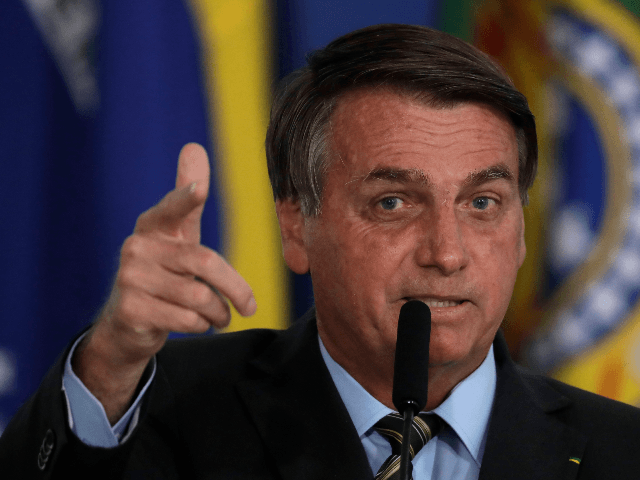Brazilian President Jair Bolsonaro advised journalists during remarks at an event with doctors on Monday that they have a lower chance of surviving a Chinese coronavirus infection because they are “fat-asses.”
Bolsonaro’s remark, followed by accusations that journalists engage in “evil” and “debauchery,” occurred one day after Brazilian establishment media widely condemned the president for telling a reporter, “I want to stuff your mouth with punches.” Bolsonaro was reacting to a question about a Brazilian magazine report revealing ties between his wife and a former aide arrested on charges of corruption.
Bolsonaro was speaking at an event addressing doctors handling Chinese coronavirus patients on Monday. Brazil has one of the largest documented numbers of cases in the world — second only to the United States, with the caveat that rogue regimes like China, Russia, and North Korea are likely not publishing accurate data. At press time, Brazil has documented about 3.6 million coronavirus cases and a little over 115,000 deaths. Bolsonaro has taken significant criticism for this because of his insistence on not locking down the nation’s economy, actively promoting business as usual in contrast to many other states.
Bolsonaro himself tested positive for Chinese coronavirus in July, enduring what he described as a mild case that appeared to last less than a month. Discussing his experience with the disease on Monday, Bolsonaro attributed his success in combating it to his past as an “athlete” and soldier.
“But that story is about an athlete, you know?” Bolsonaro told reporters of his case. “Someone in the press engages in debauchery, but when one of you fat-asses get it [coronavirus], the chances of survival are much lower.”
“They [the press] only know how to do evil, how to use a pen in large part malevolently,” he added, according to the national newspaper O Globo.
O Globo‘s reporter was the target of Bolsonaro’s attack on Sunday. While the newspaper did not name the reporter, it did identify itself as the outlet responsible for asking Bolsonaro about an article in the magazine Crusoe claiming that First Lady Michelle Bolsonaro received about $13,000 from Fabricio Quieroz, a former driver for Senator Flavio Bolsonaro, the president’s son, arrested for corruption charges.
“I want to stuff your mouth with punches, ok?” Bolsonaro replied. He did not address the accusation.
Any potential ties to corruption would be particularly damaging to Bolsonaro as his presidential campaign was based largely on his clean record in a nation enduring years of one of the world’s biggest corruption scandals: “Operation Car Wash,” a sprawling kickback scheme in which politicians of nearly every political party took money from contractors like the construction firm Odebrecht in exchange for granting them overly priced government infrastructure contracts. Operation Car Wash led to the impeachment of socialist President Dilma Rousseff and the arrest and conviction of her predecessor and mentor, Luiz Inácio Lula da Silva.
Bolsonaro has developed an adversarial relationship with the media, as an outsider conservative president facing established press institutions that lean left in the country. He has repeatedly denounced “fake news” meant to smear him in mainstream reports and relied heavily on social media to directly address supporters. Opponents in the government have thus taken to targeting supporters in grassroots social media. In May, Brazil’s top court, the Supreme Federal Tribunal (STF), ordered raids on the homes of 29 people — largely conservative journalists, comedians, and other public Bolsonaro supporters — for allegedly spreading “fake news” about the court.
Media outlets described Bolsonaro’s event on Monday as meant to promote the use of hydroxychloroquine, a drug typically used to fight malaria that has sparked heated global debate over its potential use against Chinese coronavirus.
Bolsonaro personally took hydroxychloroquine throughout his infection, publishing videos of himself on social media taking the drug.
“To those who cheer against hydroxychloroquine, but do not present alternatives, I regret to inform you that I am very well with its use and, with the grace of God, I will live for a long time to come,” Bolsonaro wrote in July.
On Monday, Bolsonaro once again praised the drug and the doctors prescribing it.
“If hydroxychloroquine hadn’t been politicized, a lot more lives could have been saved,” he told the doctors, adding, “history will not remember the weak, cowardly, and silent.”
– Dos fracos, covardes e omissos a história jamais se lembrará. A demagogia política custou empregos e vidas.
– Parabéns a todos os médicos que agiram corajosamente na linha de frente desta dura batalha!
– Desde o início, nos posicionamos: saúde e emprego caminham juntos! pic.twitter.com/oTt7cX5sSF
— Jair M. Bolsonaro (@jairbolsonaro) August 24, 2020
Bolsonaro has spent months urging Brazilians to attempt to maintain a sense of normalcy throughout the pandemic, visiting businesses personally in an attempt to convince citizens to support the economy. His remarks have prompted outrage on occasion as he has expressed little concern about the threat the virus poses.
“The virus is here, we’re going to have to confront it. Confront it like a man, not a boy!” Bolsonaro said during one public appearance in March, telling the country, “We’re all going to die one day.”
Bolsonaro has also referred to the virus as a “little cold.”

COMMENTS
Please let us know if you're having issues with commenting.